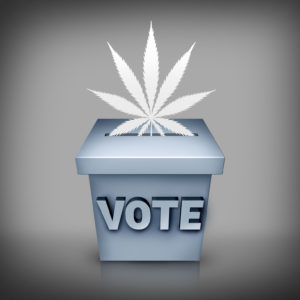Americans sent a clear message on Election Day that it is time to end the war on drugs. Every ballot measure to decriminalize or legalize drugs received overwhelming approval from voters. There was, however, one notable exception: nicotine.
Voters in five states approved marijuana legalization measures. Arizona, New Jersey and Montana approved recreational marijuana, South Dakota legalized both medical and recreational, and Mississippi legalized medical cannabis.
Meanwhile, Washington D.C. approved a measure to decriminalize a number of psychedelic drugs, including “magic mushrooms.” Oregon voters also approved the use of psilocybin mushrooms and decriminalized possession of small amounts of all illegal drugs.
Oregonians, however, also voted to impose a 65 percent tax on nicotine vaping and heated tobacco products.
Additionally, state legislatures around the country are considering or have instituted bans on certain flavors or types of nicotine vapor products. Yet, these non-combustible sources of nicotine are substantially less harmful to health than smoking and are among the most effective means of helping smokers quit their deadly habit.
How is it possible that Americans have grown more tolerant toward “hard” drugs and more intolerant toward a functionally harmless drug like nicotine? The answer seems to lie in the accepted narratives that surround these different substances.
Though most Americans do not use cannabis, a majority now recognizes that criminalizing it is costlier and more harmful than its use.
Legalizing cannabis, and increasingly other drugs, is now viewed as a means of preserving personal choice and pursuing social justice. These priorities should be part of the debate surrounding nicotine vapor products, but, thanks to well-funded misinformation campaigns, they aren’t.
Anti-tobacco outfits have misled the public into believing that nicotine vapor products are just another Big Tobacco product, that they are no less harmful than smoking, prey on minority communities, and threaten public health.
With ample funding, including from Michael Bloomberg and Bill Gates, they have flooded news media with scare stories about youth vaping and vaping-related illness, and convinced a majority of the public that nicotine in any form is harmful (except in a patch, gum, or lozenge produced by pharmaceutical companies). All of those “facts” are wrong, but it hasn’t stopped them from spreading.
The academics, activists, and health professionals that comprise the tobacco control industry have recently faced a conundrum. After decades of warning about the dangers of smoking, reductions in the behavior had slowed.
Then came e-cigarettes, which promised smokers a way to enjoy nicotine without the risk of combustible tobacco. Based on all available evidence, they delivered on that promise. The smoking rate for adults and youth is lower than it has ever been.
Some tobacco control advocates recognized this as an achievement, but others saw it as a threat to their funding and influence. Thus, they turned against not only smoking, but against any use of non-pharmaceutical nicotine as an “addiction,” though one with no discernable harms. Attempting to control people’s behavior, not because it is harmful, but because someone thinks it’s “bad” is not public health; it’s a moral crusade.
Groups like the American Lung Association, American Heart Association, and American Cancer Society have been lobbying for policies that actually push people toward cigarettes — the product that truly puts people at risk for lung and heart problems, as well as cancer — by making vapes less available without recognizing the contradiction.
Prohibiting vapes will backfire the same as the prohibitions on other drugs. That includes the growth of black markets and conflicts with law enforcement. And minority and low-income populations will suffer the most from taxes and restrictions that make lower-risk alternatives less accessible.
The evidence overwhelmingly indicates that e-cigarettes are more effective for smoking cessation than other therapies, that smokers who switch to vaping rapidly show improvements in health, and that nicotine itself does not cause cancer.
In May 2019, the Food and Drug Administration (FDA) approved for sale the IQOS, a product marketed by Altria that heats tobacco instead of burning it. In June of this year, the FDA granted Altria the right to market IQOS as a lower-risk tobacco product because it exposes users to fewer harmful chemicals than cigarettes.
When forced to make a decision based on evidence, the FDA recognized the benefits of giving smokers a safer alternative.
The evidence is clear that e-cigarettes are even less harmful than products like IQOS, so the FDA will be obligated to approve other nicotine vapor products, and may even allow some of them to be marketed as lower risk, since that is indisputably the case when compared to smoking.
Yet, anti-nicotine advocates will probably continue pushing for bans, taxes, and restrictions even as it becomes undeniable that such policies are bad for public health because, like every drug war that came before, it is just another moral crusade in disguise.

